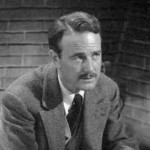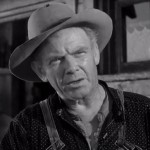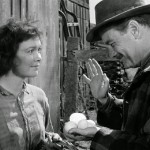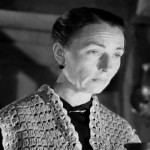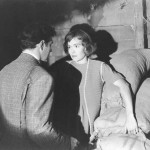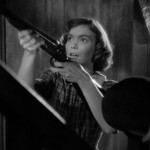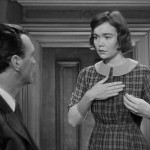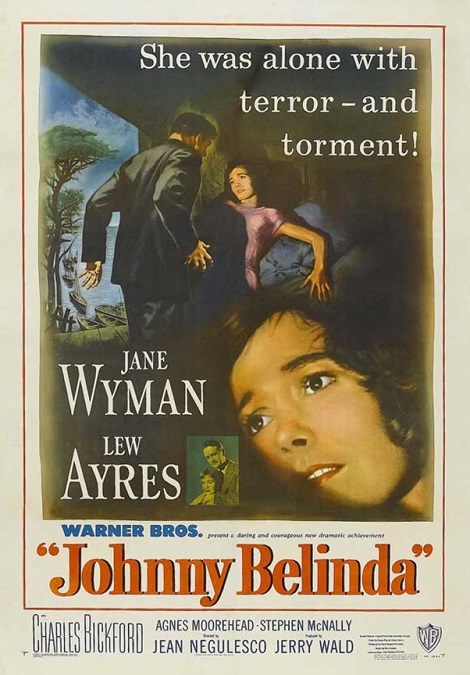
Johnny Belinda – 1948
This was a good film that starred Jane Wyman as a young deaf-mute in Nova Scotia. What made the film so good was the engaging plot, which was easy to follow and well written. But before getting into why it was such a good movie, I have to have my say about the fact that Jane Wyman took home the Oscar for Best Actress for her portrayal, beating out Olivia de Havilland in The Snake Pit. Olivia – you were robbed!
But this review isn’t about that. It is about the virtues of Johnny Belinda, and its exceptional cast of actors. Wyman, of course, played the female lead, Belinda McDonald. As a deaf-mute, everyone on the Island of Cape Breton, including her father, Black, played by Charles Bickford, and her Aunt Aggie, played by Agnes Moorhead, thought she was stupid and retarded.
But the new doctor in the town, Dr. Richardson, played by Lew Ayres, doesn’t believe it. He learns sign language well enough to teach it to her, and establishes communication. He discovers that she is really intelligent and, goes out of his way to educate her.
But the real drama of the plot begins when the town’s resident bully and womanizer, Locky, played by Stephen McNally, sees Belinda as she is blossoming from an ignorant young girl into an attractive young woman. He gets drunk and rapes her. The rape scene was significant on a number of levels, the most prominent of which was that pesky Hayes Code. Rape was considered an unsuitable subject for the movie-going audiences of the time. Johnny Belinda, however, is considered the first Hollywood film to get around the Code on the subject.
It also really set up the drama for the rest of the film. Imagine being a deaf mute whose ability to communicate is not very strong. If you are violently raped, how do you tell anyone what happened? You’re still working on signs for “father” and “thank you.” It made me horrified for her character who had to endure the crime in silence.
But then we learn that the rape produced a child. This is where the supporting cast of actors, Bickford and Moorhead, really got to shine. The shock and anger that came out was real and believable. Moorhead, in particular did a fantastic job in the heart-wrenching scene where she learns of the girl’s pregnancy. She curses herself for being so hard on Belinda and promises to take care of her.
Bickford also had his moments, like when he learns of the baby, when the baby is being born, and, when he finally figures out who had raped his daughter. He fights Lockey but unfortunately is killed.
It turns out that Belinda is an excellent mother and loves her son, Johnny (hence the film’s title), enough to kill for him. When Locky, knowing that the boy is his, tries to take him from Belinda, she shoots him dead. Then there’s a trial, in which Belinda is accused of murder, and the truth finally comes out. Locky’s wife, Stella, played by Jan Sterling, who had learned what really happened, breaks down and tells the court everything. Belinda is released and gets to keep her baby. But just to give the film an even more uplifting ending, Dr. Richardson, who has fallen in love with Belinda, takes her and Johnny away to live happily ever after. Yay Hollywood!
The film had a great story to work with, but my problem is that they just didn’t take it far enough. First of all, there was the rape scene. Granted, it was new territory for movies and they handled it well enough. But they could have done a much better job with Belinda’s reaction. It wasn’t anywhere near intense enough. Belinda was a young and innocent girl who had just been raped, with no way to tell anyone what had happened. But all that happens is just that she becomes sullen and unresponsive for a while, until Dr. Richardson shows up and gets her to visit another physician with him. Then, she is apparently fine. Even seeing Locky at church doesn’t get that much of a reaction out of her. She shies away a little and turns her head, but that’s it. There was so much opportunity for a more intense performance, but it was all missed.
And that brings me to my second problem with the film. Wyman’s performance was good, but it could have been great. The whole thing was too calm and demure. If she didn’t seem to feel strongly about what was happening to her, then why, as a viewer, should I?
Just as a fun little last thought, there was a wonderful line in the film that might have been easy to miss, but it had me laughing out loud. When the town’s old ladies are gossiping, one says of Stella, “She’s her own worst enemy,” to which another replies, “Not as long as I’m alive, she isn’t.” What a great line!
